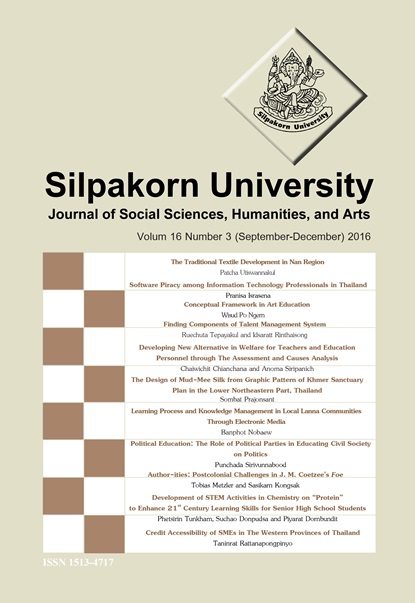Learning Process and Knowledge Management in Local Lanna Communities through Electronic Media
Main Article Content
Abstract
Information and news are certainly significant for people as a basic right that everyone can be able to gain access and use in everyday life. This study has three main objectives: (1) to investigate the learning processes of local communities of the north of Thailand using electronic media; (2) to investigate the knowledge management of the two communities through electronic media; and (3) to investigate the patterns of media usage which suit to the two communities learning. This study investigated in the two local communities in Chiang Rai province, Thailand. The result shows that the two villages have similarly characteristic structure of information receiving; most villages acquire an information from the centralization system through a variety of media. However, the two communities have used different media types and have different numbers of community grouping. They have a similar pattern of information exchanging among the community’s members. Likewise, people in the two villages usually make an information judgment by comparing media contents with different media channels.
Downloads
Article Details
All rights reserved. Apart from citations for the purposes of research, private study, or criticism and review,no part of this publication may be reproduced, stored or transmitted in any other form without prior written permission by the publisher.
References
Barnes, S. (2002) Knowledge management systems theory and practice. The Alden Press, Oxford, London.
Chandler, D. (2007) Semiotics: the basics. London; New York: Routledge.
Defleur, M. L. & Dennis, E. E. (1994) Understanding Mass Communication: a liberal arts perspective, 5th ed., Boston: Houghton Mifflin.
Kanjanapan, A. (2001) Community dimension: the way thinks with the right, power, and resource administration. Bangkok: Thailand Research Fund (TRF).
Garvey, B. (2002) Beyond knowledge management: Dialogue, creativity and the corporate curriculum. Pearson Education, England.
Holden, N. J. (2002) Cross-cultural management: a knowledge management perspective. Harlor: Financial Times Management.
Housel, T. & Bell, A. A. (2001) Measuring and managing knowledge. McGraw-Hill, Boston.
Huff, A. S. & Jenkins, M. (2002) Mapping strategic knowledge. SAGE, London.
Kaewthep, K. (2004) Media analysis Concept and Technique, 4th ed., Love and live, Bangkok.
Kaewthep, K., Nanta, S., Natechey A., Nasree A. & Boonpradit S. (2006) Communication to manage the resources of the community in the future. Bangkok: Thailand Research Fund (TRF).
Kaewthep, K. & other (1999) The review’s communications system for the community. Thailand Research Fund (TRF).
Kermally, S. (c2002) Effective knowledge management: a best practice blueprint. hichester: Wiley.
Kongsawat, P. (2005) The change of identity to interact State: The Case of Karen’s role in Ban Hin Lard Nai, Wiang Pa Pao. Chiang Rai. Silpakorn University.
Lerner, D. & Schramm, W. (1967) Communication and Change in the Developing Countries. Honolulu: East-West Center.
McQuail, D. (1997) Audience Analysis. Thousand Oaks, CA: Sage Publications.
McQuail, D. (2005) McQuail’s Mass Communication Theory, 5th ed., Thousand Oaks, CA: Sage Publications.
Ministry of Information and Communication Technology (MICT). (2004) Thailand international conference on knowledge management 2004: KM for innovation and change November 24-25, 2004 Impact Muang Thong Thani, Hall 4, Nonthaburi, Thailand. MICT, Bangkok.
Prichanjit, S. & other. (2006) The learning process and knowledge management of the culture and local community. Thai Health Promotion Foundation (ThaiHealth) and Thailand Research Fund (TRF).
Saengkor, D. (2007) The history of Baan Roung Kor Rogers, E. M. 1976. “Communication and Development: The Passing of the Dominant Paradigm”. Communication Research, vol. 3:213-240.
Simalak, S. & Other. (2006) Development of knowledge management mechanism for local development in district and Sub - district. Thailand Research Fund (TRF).
Sothanasatian, S. (2007) The Principles and guidelines for the management of communication: three dimensions in the field of communication for management,
management of communication and administration of mass-communication phase 3. Thailand Research Fund (TRF).
Brelade, S. & Harman, C. (2003) Practical guide to knowledge management. London: Thorogood. Retrieved from https://site.ebrary.com/id/10088321
Brelade, S. & Harman, C. (2003) Practical guide to knowledge management. London: Thorogood. Retrieved from https://site.ebrary.com/ id/10088321
Farrington, C., Clare, I. C. H., Holland, A. J., Barrett, M. & Oborn, E. (2015) Knowledge exchange and integrated services: experiences from an integrated community intellectual (learning) disability service or adults. Journal for Intellectual Disability Research 59(3), 238–247.
Kutintara, P. (2007) Learning Process and Transmission of Folk Wisdom in Pottery Making in Nonthaburi, Thailand. International Journal of Learning 14(8)
Ma Rhea, Z. (2013) Buddhist wisdom and modernization: finding the balance in globalized Thailand. Globalizations 10(4), 635–650.
Mattos, N. M. (1991) An approach to knowledge base management (Vol. 513). Springer.
Tangnamo, S. (2004) Research In Visual Culture.
Tsui, E. (2009) 3rd Asia-Pacific Conference on Knowledge Management. Emerald.
Tichenor, P. J., Donohue G. A. & Olien, C. N. (1970) “Mass Media Flow and Differential Growth in Knowledge”. Public Opinion Quarterly, vol.34: 159-170.


